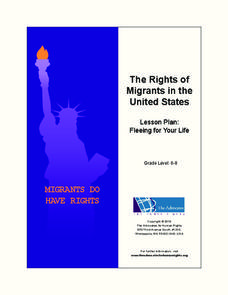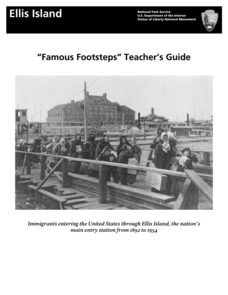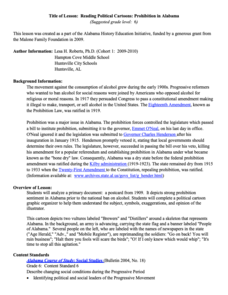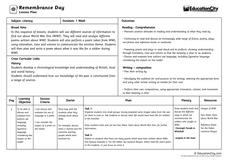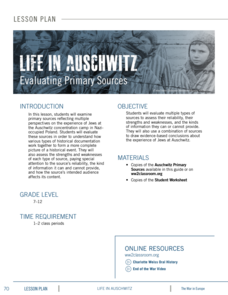School Improvement in Maryland
Evaluating Political Advertisements
How do interest groups try to influence elections? As part of their study of the election process, groups view 30-second advertisements produced by advocacy groups and use the provided worksheet to evaluate these ads. They then craft...
Classroom Law Project
Should we believe everything we read? Becoming a discerning consumer of media
Class members investigate the role media should play in a healthy democracy. As part of this study, groups analyze political advertising, use FactCheck to assess not only the veracity of but the persuasions techniques used in candidates'...
Advocates for Human Rights
Deliberative Dialogue
How do you create a classroom environment where hot button topics may be discussed in a respectful manner? As part of a series of lessons that focus on immigration issues, class members examine the rules for civil discussion before...
Advocates for Human Rights
Civic Engagement and U.S. Immigration Policy
To conclude their study of immigration and human rights, class members create a civic engagement project centered on an issue of immigration and designed to influence US immigration policy. They examine examples of attempts to...
Advocates for Human Rights
The Rights of Migrants in the United States Lesson Plan: Fleeing for Your Life
A role-playing scenario has middle-schoolers imagining that they are refugees forced to flee their community and integrate into a new one. Then, some play the roles of members of the new community and the class brainstorms ideas about...
National Park Service
“Famous Footsteps” Teacher’s Guide
As part of a study of Ellis Island Immigration Station, class members assume the role of immigration service workers, investigate the dossier of an immigrant, and recommend whether or not their subject should be allowed to enter the US....
Benjamin Franklin Tercentenary
Franklin, Master Diplomat
While many often associate Ben Franklin with his kite electricity experiments, budding historians find out he contributed much more. They discover Franklin's political savvy by examining primary sources in the informative installment of...
Alabama Department of Archives and History
Reading Political Cartoons: Prohibition in Alabama
What makes a cartoon political? The lesson plan provides learners with political cartoons and teaches how to analyze them using a five-step process. Scholars also complete a hands-on activity and participate in group discussions to...
Alabama Department of Archives and History
The Effect of the Great Depression on Children and Education
What was it like to be a kid growing up during the Great Depression? Academics study primary sources to analyze the effect of school closures on children during the Great Depression. They then participate in group discussions and writing...
North Carolina Consortium for Middle East Studies
The Importance of Holocaust Remembrance
Designed as the culminating activity after a unit study of the Holocaust, class members assume the voice of a world leader, write a speech, and participate in a simulation of the Stockholm International Forum on the Holocaust.
Education City
Remembrance Day
Eleventh hour. Eleventh day. Eleventh month. 11th year. As part of a study of World War I and Remembrance Day, class members consider what it was like to be a soldier during war.
Channel Islands Film
Dark Water: Lesson Plan 3 - Grades 6-12
After watching the documentary Dark Water about a traditional Chumash ceremony and reading a Chumash origin story, viewers are asked to create a coat of arms and to craft an essay that details a family tradition or their own origin story.
Channel Islands Film
Human Impact on the Food Web of Santa Cruz Island
What happens when a non-native species is introduced onto an island? Santa Cruz Island, part of the Channel Island chain located off the coast of southern California, provides the perfect laboratory for young environmental scientists to...
Channel Islands Film
Once Upon a Time (Sa Hi Pa Ca): Lesson Plan 3
What was the most significant tool used by the Chumash? How did the environment make the tool possible? What group behaviors allowed the Chumash be be successful for thousands of years? After watching West of the West's documentary Once...
Channel Islands Film
Once Upon a Time (Saxipak’a): Lesson Plan 4
How did the environment and natural resources found on the Channel islands influence the culture of the Chumash? Archaeology meets technology in an activity designed for middle schoolers. After viewing West of The West's documentary Once...
PBS
Ken Burns: Jackie Robinson Taking the Measure of a Man
During his first few games as the first black player in Major League Baseball, Jackie Robinson proved that he could withstand the wily curveball of Johnny Sain as well as the racial epithets shouted from opposing teams' dugouts. A short...
Race Briges Studio
I am Indopino: Or, How to Answer the Question, "Who Are You?"
In our increasingly multi-ethnic society, many students find it difficult to identify themselves as belonging to any one ethnicity. Gene Tagaban, a Tlingit, Cherokee, Filipino offers his personal experiences with these questions in his...
National WWII Museum
Life in Auschwitz: Evaluating Primary Sources
Historians explain what happened during the Holocaust, but only primary sources portray the true horror of places such as Auschwitz. Using accounts from those who survived the camps, as well as a Nazi government official's memoirs, class...
PBS
Stereotypes vs. Statistics (Grades 4-8)
Stereotypes can be painful if they are used to discriminate against others. Statistics, however, can be helpful in dispelling myths propagated by stereotypes. Using a thoughtful lesson plan, scholars complete graphic organizers...
National Woman's History Museum
Seneca Falls and Suffrage: Teaching Women's History with Comics
As part of the study of women's history, young scholars examine Chester Comix's strips about the Seneca Falls Convention and four 19th century leaders in the struggle for equal rights. After researching other elements of the Suffrage...
American Battlefield Trust
The Home Front
Women and children played key roles during the Civil War, even if their voices are often lost in history. By studying letters and personal testimony from them, budding historians get a glimpse into the day-to-day life of civilians during...
American Battlefield Trust
Experiencing the Battle of Franklin
Scholars watch videos, study an animated map, and read a firsthand written account to explore the impact of the Battle of Franklin during the Civil War. Academics analyze images, complete worksheets, and create journal entries to...
American Battlefield Trust
Life At War
A thought-provoking lesson plan explores what life was like for Civil War soldiers. With a presentation, group discussion, and writing activity, academics learn about camp living conditions, what soldiers ate, and how they dressed.
Curated OER
Native Americans in Arkansas: The Quapaw
The Quapaw Indians of Arkansas are the focus of this American history lesson. Learners discover many aspects of the Quapaw culture, such as their dwellings, social organization, food, and how the tribe was eventually driven out of...
Other popular searches
- Alberta Social Studies Plan
- Social Studies Plan Canada
- Social Studies Plan Africa
- Social Studies Plan Wwii
- Social Studies Plan Dictator
- Social Studies Plan Eskimos
- Lesson Plans Social Studies
- Social Studies Plants
- Unit Plan Social Studies
- Social Studies Lesson Plan Ell
- Unit Planning Social Studies




